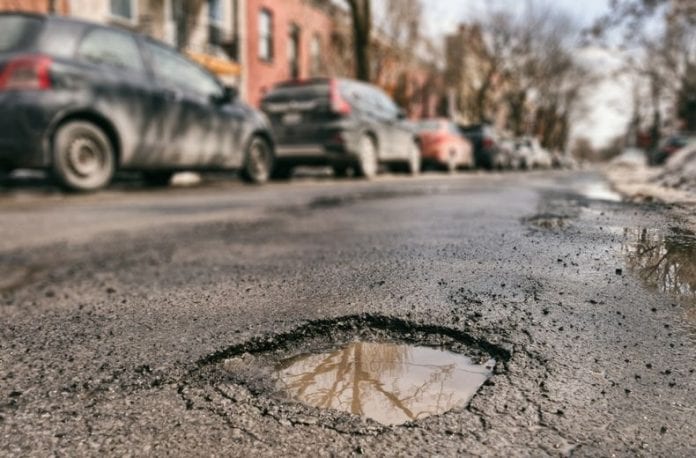| Data obtained by Cycling UK shows 69% of local authorities in Wales have less budget for road maintenance than they did in 2016/17, when adjusted for inflationCycling UK’s Pothole Watch campaign runs from March 1 to 7, highlighting the need for investment in local roads and calling on the public to report road defectsOnly one Welsh council in eight filled every reported pothole within its target timeAs overall highway spending increases, maintenance of local roads, which account for the majority of journeys, is getting left behindLatest estimates suggest the cost of fixing Wales’s pothole problem is £722m |
| More than two-thirds of local authorities in Wales have seen their budget for road maintenance fall in real terms over the past five years, according to research published today by Cycling UK.The figures, released to mark the national cycling charity’s Pothole Watch campaign, which runs from March 1 to 7, highlight the lack of funding to deal with the ever-worsening state of Britain’s roads, meaning that just one in eight councils are now able to meet their own target repair times for fixing potholes. The charity is calling on the public to report holes and other road defects they spot while out on essential journeys by using the interactive map on its Fill That Hole website, www.fillthathole.org.uk.Out of 13 Welsh councils that responded to Cycling UK’s Freedom of Information enquiries about pothole maintenance budgets, nine (69%) reported a decrease in budget from 2016/17 to 2020/21, when adjusted for inflation. The total road maintenance funding allocated to the responding councils has risen by just 2% between 2016/17 and 2020/21, well below the rate of inflation (approximately 9% over the same period).Of eight councils in Wales that responded to further requests on pothole repair targets, just one (Isle of Anglesey/Ynys Môn) stated that it repaired 100% of reported potholes within its self-imposed target times over the past five years. Half of the responding councils met their targets less than 75% of the time, with the worst performer being Caerphilly, meeting its target for 55% of reported potholes. The most recent data from the Asphalt Industry Alliance (AIA) show that in 2020 it would have cost £722m to bring roads up to standard across Wales. While this is an improvement on the figure of £797.5m the previous year, the pothole problem will not go away if local authorities continue to see their funding shrink.With 68% of journeys in the UK being less than five miles, Cycling UK says while local roads are the backbone of our transport network, investment is continuing to stagnate in favour of spending on major routes, with predictable results. As well as causing £1.25bn worth of damage to vehicles across the UK each year, potholes put the lives of vulnerable road users in danger: since 2016, 10 cyclist deaths and 178 serious injuries have been attributed to road defects in Great Britain.“Our findings sadly confirm that the Welsh Government’s investment in pothole repairs is doing as much good as a sticking plaster on a broken leg” said Keir Gallagher, campaigns manager at Cycling UK.“Potholes affect all road users, but they’re particularly dangerous for people cycling. With a majority of councils in Wales seeing their pothole budgets shrinking in real terms over the past five years, the next Welsh Government must commit to addressing the pothole repair backlog on our local roads, as part of a wider shift towards a highways investment strategy focused on enhancing the provision for cycling and walking”While Cycling UK would like to see proper government funding to allow local councils to maintain our roads properly, Mr Gallagher is also calling on the public to do their bit in alerting them to problems in the first place. “On average, there is one defect for every 110 metres of road in the UK. Reporting and getting those potholes fixed by your local authority is easy using the Fill That Hole’s interactive map and app, at www.fillthathole.org.uk.” |
Help keep news FREE for our readers
Supporting your local community newspaper/online news outlet is crucial now more than ever. If you believe in independent journalism, then consider making a valuable contribution by making a one-time or monthly donation. We operate in rural areas where providing unbiased news can be challenging. Read More About Supporting The West Wales Chronicle






















